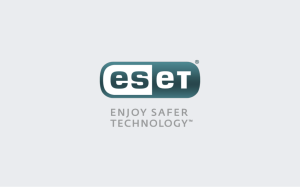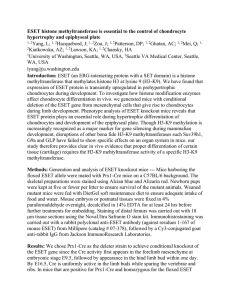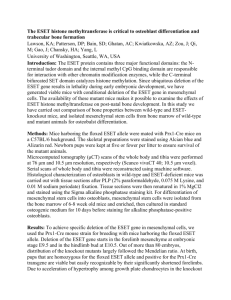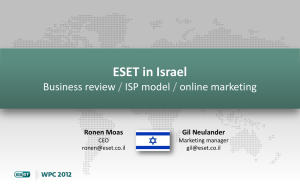International Business Case
advertisement
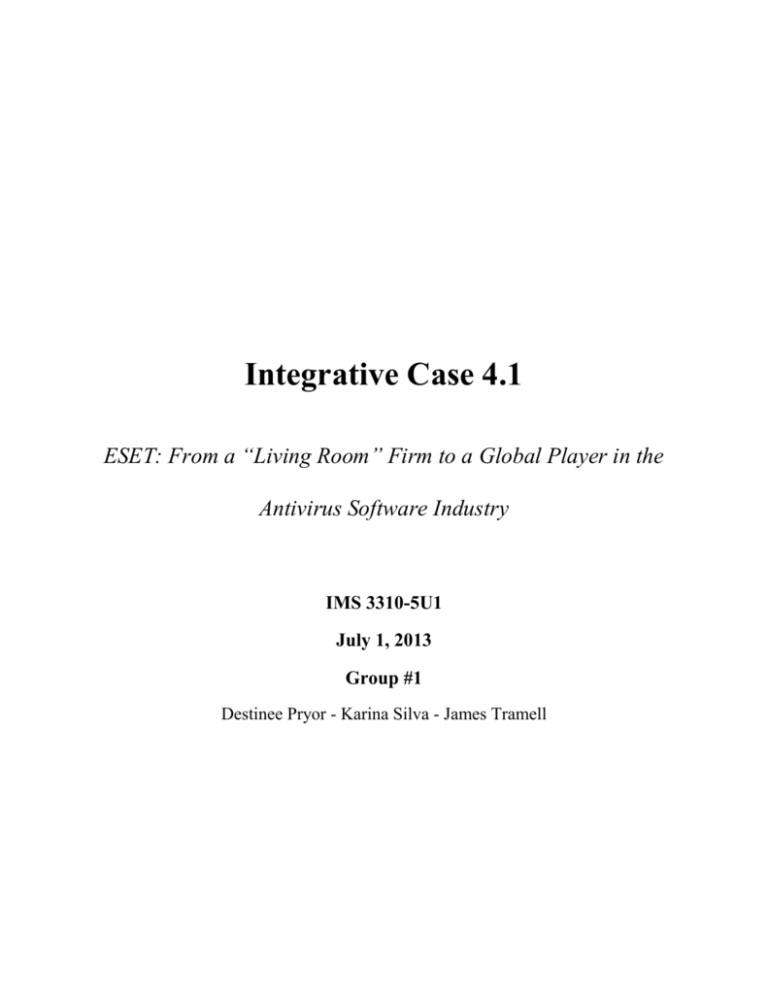
Integrative Case 4.1 ESET: From a “Living Room” Firm to a Global Player in the Antivirus Software Industry IMS 3310-5U1 July 1, 2013 Group #1 Destinee Pryor - Karina Silva - James Tramell Starting up being ran out of a small apartment in Bratislava, Slovakia, ESET, spol. s.r.o. was established in 1992 by its founders Rudolf Hruby, Peter Pasko and Miroslav Trnka. Without its first two enthusiasts Peter Pasko and Miroslav Trnka and their discovery of the world’s very first computer virus (later named “Vienna”) in the late 1980’s, ESET may have never stepped foot in the world of antivirus software. ESET is now a world-wide leading advanced security solutions company owned by its six private Slovak IT specialists, selling an assortment of products to companies and customers around the world. To add to this, ESET is now recognized as being one of the top five global players in the antivirus software market. Going back to the 1980’s, around the start of the Velvet Revolution, Czechoslovakia’s economy was highly regulated and strongly against the running of private businesses. After their discovery of the world’s first computer virus “Vienna”, Pasko and Trnka turned around and wrote their very first software program for protection and elimination of the Vienna virus. This program they called “NOD”, which stands for “Memocnica Na Okraji Disku” (Hospital on the Edge of the Disk). Given the strict political conditions during this time, Peter Pasko and Miroslav Trnka found it hard to reveal their discoveries and products to the world through commercialization; not to mention, exporting was out of the question. Dealing with this, the two started out by allocating their software programs for close-to-free to nearby close friends and IT enthusiasts like them. To them this was a better alternative opposed to hiding and waiting for the transformation of their country to take place. Years later in 1989 after the Velvet Revolution had ended, Czechoslovakia had become a newly formed democracy and opened their arms out to the Western world. With this awaited transformation, private businesses began to expand tremendously, which led to Pasko and Trnka having the ability in 1990 to sell their NOD program in Austria, under the name “Stopvir”. Throughout that first year, they were able to earn their first million in local currency in revenues (equaling $36,000 U.S.). After their first year since becoming established, in 1993, Czechoslovakia broke up and formed the two new countries: the Czech Republic and Slovak Republic. With this, ESET lost a huge chunk of their valuable markets. Stemming from this loss, in hopes to turn things around, Trnka began donating advice in the local magazine PC Revenue, and eventually won the company their first ever Virus Bulletin award in 1998. This benefited the company greatly by getting their name out into the new markets; eventually leading towards them earning the attention of many international users and foreign distributors. Shortly after in 1999, ESET LLC established themselves in San Diego, California, with the idea in mind to make this location be ESET’s international business center. By doing this, the company soon found themselves surpassing their negative country-of-origin alliance all while heading down the road towards increased revenues and being known as the leading global player in the industry. Skipping forward about fifteen years, there was now an enormous saturation in the market with many new technological innovations, such as: smart phones, tablets, computers, mobile broadband technology, cloud computing and much more. With this vast amount of new technology, there became a huge increase in the jeopardy of malware to users within their devices. This was great news to ESET! In 1990 there were estimates of 200 to 500 different viruses; now, in the 2000’s, computer viruses were ranging from the 50,000’s! Generating from this, from 2000 and forward, ESET experienced rapid growth through their company, product developments, and their revenues. Sales in local currency had shot up by a factor of 150(!) during 2000 and 2010; alongside this, foreign sales accounted to 90% of overall sales in 2010. With all of this commotion going on throughout the cyber world, ESET made two very qualified decisions in the purchasing of two companies: Setrenet, a security company in Czech, and Comdom Software, a software company in Slovak. The purposes behind these two purchases were to: expand the company’s suggestions towards information security services, and to increase the company’s capacity for creating new superior security solutions. To add on to these great years of success and advancement, throughout these successful years, ESET made it a point to maintain its presence throughout the company’s many established R&D (Research and Development) centers throughout Europe, the Americas and Asia. The purpose for these accredited centers is to give ESET the ability to react successfully to the increasing amount of cyber threats and technological challenges in computers and other devices. In order to make this all possible, ESET secures their successes and future endeavors by equipping their company with an incredible team of highly skilled, intelligent, and innovative employees. As their mission statement says: “Intelligent people develop intelligent products for intelligent customers.” ESET requests that all employees and management live by three specific values: responsibility, reliability and innovativeness. In order to make this possible, ESET provides all employees with many benefits in which to satisfy and help educate their employees. Some of these benefits encompass team building events, skill trainings, language courses, pension schemes, health insurance, etc. These are only a number of the benefits provided to employees to help raise their satisfaction and keep the company from producing a high turnover rate. 1.) How could a company from Slovakia become a leading global player in the antivirus software industry? The answer to this is easy. The beginning of ESET’s unpleasant journey was one not many future business owners tend to successfully make it through. Based on what has been provided above, as a company from Slovakia, ESET accomplished a great number of successes throughout its many years since establishment. This capability stems from a vast amount of executive decisions, positive ambitions and the forming of a highly gifted and innovative team of employees. For starters, the business and its ideas were first constructed in an apartment during the time of a strictly closed economy; this alone takes a great deal of effort to prevail through. No matter the circumstance and the impossible, ESET founders Pasko and Trnka worked relentlessly until they found themselves outside of a current situation; even through times of very limited potential for success. When the country split up and success began to slow down, the company made a number of decisions in which to buy current companies to help spread their name, as well as expand their company throughout other countries. It is quite obvious to say that the time to celebrate and reflect back on their journey didn’t come until about their eighth year after establishment in 2000. At this point there became more opportunity for viruses to take over the cyber world given the vast amount of new technology. It may have taken awhile for this company to reach this point, but they did all they could in order to prepare for a chance such as this. They surrounded themselves and their company around leading IT markets with demanding eager customers of who would encourage ESET’s best pioneering endeavors. With this opportunity in hand, ESET ran with it, and ended up with a huge amount of success; not to mention achieving a number of recognizable awards along the way. In saying that, in order to become a leading global player in the antivirus software industry it takes a great deal of confidence, ambition and the ability to conquer an immeasurable amount of conditions and highly administrative judgments. These few suggestions are only a small fraction of what it takes to become a leading global player amongst all other competitive businesses out there. It all depends on the desire and drive of the managers and employees within a company to construct and lead a business down the road of success and continuous growth. 2.) From a resource-based view, what are ESET’s sources of competitive advantage? It is evident that the two developers of ESET did not have many resources in the beginning to start off their business. It is even said that their “recording, labeling, and packaging of diskettes,” were produced in their own living room. So these developers had to come up from basically nothing. In other words, the resources and the opportunities were very low and even though their first years were a little tough, they managed to overcome many obstacles. In a resource-based view, internally ESET has become successful in different ways. For example, due to the economy being so strict and regulated in Czechoslovakia, there were very limited resources. There were a lot of different factors going on, such as the end of the Velvet Revolution and the communism of the country, which made exporting to other countries impossible. This forced them to focus on an internal strategy to grow as a business. There were a lot of risks that were taken and while many small firms would have fallen, ESET managed to achieve success through these risks. ESET had to focus on the reliability of their software to attract firms. One intangible resource that helps ESET is its reputation of reliability and effectiveness of its product. One way its’ name grew was by winning the first British Virus Bulletin award in 1998. This helped the company’s reputation internationally, and foreign companies became interested in purchasing the software. This prestigious award is one of a kind because of its demanding testing methods. In fact, in 2012, as the leader in proactive protection, ESET received its 75th VB, "VB100"award. In the year 2002, ESET was ranked as one of the fastest growing companies in Europe, Middle East and Africa. This absolutely plays a big role in competitive advantage with other companies within the software industry. Also, ESET keeps up with their innovative research, and continues to grow their development capabilities. Even till this day, they are continuously researching the newly forms of malware. The expanding and modernization of a product has to do with a well-structured business strategy. A part of the theory of national competitive advantage, or diamond theory, is a firm’s strategy, structure and rivalry. This plays a role in competitive advantage with other firms around the globe. ESET is clearly an example of this concept. Another factor that distinguishes ESET from other firms’ resource wise is their focus on culture as a foundation of their success. By understanding their employees and satisfying their needs, there is a trust within the company. Organizational culture plays an important role in any firm, having this intangible resource can really make a difference because it all starts from the roots. 3.) When companies from emerging economies market their products abroad, what do they typically encounter? In any industry, firms that take the risk to go abroad need a dependable business structure. ESET, with many years of success has had the ability to do so with their innovating perspectives. For a company to be successful abroad it must be hard to imitate and it must be a desirable product or service. Also, companies face the political stress of the laws and regulations of the country they are in and the country they are trying to export to. When companies market their products abroad they have to decide on the location. This is important because it could bring many advantages. In this case, ESET established itself in the U.S., and then began to grow internationally. 4.) From an institution-based view, country-of-origin images reflect the informal rules and perceptions of the game that customers (especially those in developed economies) accept. How can companies from emerging economies overcome negative country-oforigin? There is only one way to overcome a negative image about a company’s country-oforigin and that is to downplay the origin or hide it completely. This can be accomplished through various means but is mostly accomplished by either advertising or subsidiaries. Nearly everyone has at least heard of Haagen-Dazs ice cream. They have recently released commercials about their new gelato ice cream. In these commercials you have several people pronouncing the name of the new ice cream with a non-American accent. This particular commercial downplays that this company is really an American company. Now this is not how ESET decided to go for several reasons. One being that this would require an already established product that is thought of to be foreign in nature. Another being that it would be extremely costly to produce a commercial to influence how people view the origin of the product. They decided to go a different route, through subsidiaries. To get around the negative view of a company from Slovakia, they established a subsidiary in the United States, San Diego, California to be exact. With this new American subsidiary, ESET is able tp present their products as being American products. This would allow them to unlock a larger foreign market than before.
